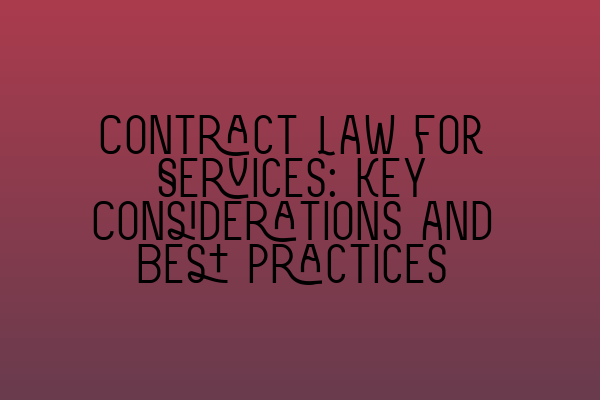**Contract Law for Services: Key Considerations and Best Practices**
Welcome to SQE Contract Law, where we provide expert advice on all aspects of contract law. In this blog post, we will be exploring the key considerations and best practices when it comes to contracts for services. Whether you are a solicitor, a business owner, or an individual seeking services, understanding the fundamentals of contract law is essential to protect your interests and ensure a successful business relationship.
**Why Contracts for Services Matter**
Contracts are the foundation of any business transaction. They outline the rights and obligations of both parties, setting clear expectations and mitigating potential risks. When it comes to services, contracts play a crucial role in defining the scope of work, timelines, payment terms, and dispute resolution procedures. With a well-drafted contract, you can avoid misunderstandings and safeguard your business interests.
**Key Considerations in Contracts for Services**
When drafting or reviewing a contract for services, there are several key considerations that should not be overlooked:
1. **Scope of Work**: Clearly define the services to be provided, including specific deliverables, deadlines, and any relevant milestones. This ensures that both parties are clear on what is expected and helps prevent disputes down the line.
2. **Payment Terms**: Establish clear and concise payment terms, including the agreed-upon fee, payment schedule, and any additional expenses. This clarity helps avoid payment disputes and ensures prompt payment for the services rendered.
3. **Intellectual Property**: If the services involve the creation of intellectual property, it’s important to address ownership rights and usage rights in the contract. This protects the interests of both parties and avoids potential conflicts over ownership and usage.
4. **Termination Clause**: Include a termination clause that outlines the conditions under which either party can terminate the contract. This includes factors such as non-performance, breach of contract, or changes in circumstances. A well-drafted termination clause provides an exit strategy and protects both parties in the event of unforeseen circumstances.
5. **Confidentiality and Non-Disclosure**: If the services require access to sensitive information or trade secrets, it is crucial to include confidentiality and non-disclosure provisions in the contract. This ensures that the confidential information remains protected and not disclosed to unauthorized parties.
6. **Dispute Resolution**: Choose a dispute resolution mechanism, such as mediation or arbitration, to be followed in case of disputes. This allows for a quicker and more cost-effective resolution process, reducing the need for litigation.
**Best Practices for Contract Drafting**
Now that we have covered the key considerations, let’s dive into some best practices when it comes to drafting contracts for services:
1. **Use Clear and Concise Language**: Avoid using complex legal jargon and instead use plain and straightforward language. This ensures that both parties fully understand the terms of the contract, reducing the likelihood of disputes arising from misunderstandings.
2. **Be Specific**: Clearly define all terms and provisions in the contract. This includes deadlines, quantities, quality standards, and any other relevant details. Specificity leaves no room for interpretation and helps avoid disputes.
3. **Get it in Writing**: Always ensure that the contract is in writing and signed by all parties involved. Verbal agreements may be legally binding in certain circumstances, but having a written contract provides solid evidence should a dispute arise.
4. **Seek Legal Advice**: It is always advisable to seek legal advice when drafting or reviewing contracts for services. A solicitor can ensure that the contract is legally enforceable and tailored to your specific needs and circumstances.
**Conclusion**
Contracts for services are a vital component of any business relationship. By considering the key elements and following best practices when drafting these contracts, you can protect your interests and establish a solid foundation for a successful business relationship. Remember, legal challenges and pitfalls may arise, so be sure to check out our related article on “Navigating Legal Challenges and Pitfalls in Your Practice”. And if you’re interested in exploring different solicitor specializations, read “Exploring Different Solicitor Specializations: Finding Your Niche”. For more general legal information, our articles on “Barrister vs. Solicitor: A Comprehensive Comparison” and “Understanding the SRA Competence Statement: A Guide for Solicitors” are great resources. Lastly, if you’re considering a career in law, be sure to check out our recommendations for the “Top Law Schools in the UK”.
At SQE Contract Law, we are dedicated to providing expert advice and resources to help you navigate the complex world of contract law. Contact us today for all your contract law needs.
[Contact us now](mailto:info@sqecontractlaw.com)
